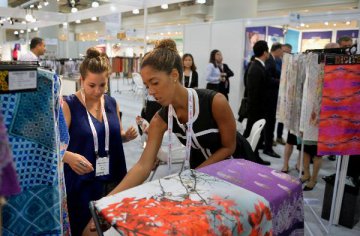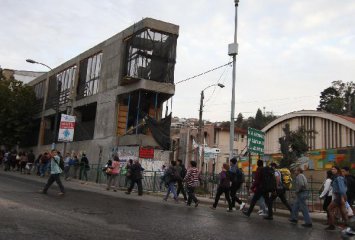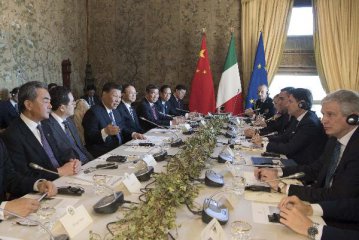by Mahmoud Fouly
CAIRO, April 8 (Xinhua) -- China's Belt and Road Initiative (BRI) is contributing to Egypt's development through massive infrastructure projects in various fields including construction, energy, transport, trade and industry.
Current Chinese investments and projects in Egypt reflect tangible and fruitful cooperation under the BRI, first proposed by China in 2013, which aims to build a trade and infrastructure network connecting Asia with Europe, Africa and beyond.
In Egypt's new administrative capital, some 45 km east of Cairo, a skyscraper that is expected to be the tallest in Africa is being built by both Chinese and Egyptian hands.
The 385-meter-high Iconic Tower will be part of the Central Business District under construction by China State Construction Engineering Corporation, which is working round the clock for a timely delivery of the district in 2022, four years after the construction started.
Visiting the construction site in late February, Egyptian Prime Minister Mostafa Madbouly described the architectural project as "a miracle by all means."
Also, a coalition of China's AVIC International and China Railway Group Limited is building a light rail transit to connect Egypt's new administrative capital with other surrounding new cities on the outskirts of Cairo.
Egypt and China enjoy distinguished relations that have been elevated in recent years to the level of comprehensive strategic partnership.
Egyptian President Abdel-Fattah al-Sisi has paid at least five visits to China since he took office in mid-2014, and he is scheduled to visit Beijing later in April to attend the second Belt and Road Forum for International Cooperation.
In the field of energy, Chinese large corporations are also working on a number of mega projects in Egypt.
China's renewable energy company TBEA Sunoasis has recently finished the construction of three solar power stations with an output of 186 megawatts as part of giant under-construction Benban Solar Energy Park in Egypt's southern province of Aswan.
In Hamrawein region on the Red Sea coast, China's Dongfang Electric and Shanghai Electric firms are building a coal-fired power plant with a total generating capacity of 6,000 megawatts. The plant, which will be constructed in about six years, is expected to be the largest of its kind in the Middle East.
China's Sinohydro has also finished the necessary studies to start soon the construction of a major pumped-storage hydropower plant in Mount Ataka in northeastern Suez province, with a capacity of 2,400 megawatts.
"Sinohydro is a world leader in this field and the project in Mount Ataka will be the first in Egypt and the largest in Africa and the Middle East region," Ayman Hamza, spokesman of Egypt's Ministry of Electricity and Renewable Energy, told Xinhua.
He added that Egypt also started cooperation with State Grid Corporation of China to construct about 1,210 km of high voltage transmission lines, besides cooperation with other Chinese companies such as Huawei and ZTE in the field of smart meters.
"China is one of the world's advanced states in the field of energy. Egypt's coordination with China is at the highest level and the cooperation between the two sides is very effective and fruitful," Hamza said.
"Egypt takes great interest in China's very important BRI and works earnestly on implementing it," he added.
The BRI-based Sino-Egyptian cooperation is also reflected in the development of trade and industry in Egypt.
China's industrial developer Tianjin Economic-Technological Development Area (TEDA) is currently developing a total area of 7.23 square km in Egypt's Suez Canal Economic Zone (SCZone) in Ain Sokhna district of Suez province.
TEDA attracted many enterprises to the SCZone, including China's fiberglass giant manufacturer Jushi, which helped Egypt become one of the largest fiberglass producers and exporters in the world over the past couple of years.
On Monday, several renowned Egyptian researchers and a Chinese senior diplomat gathered at a seminar in Cairo to discuss insights and visions on the BRI and its economic and strategic significance for participating states.
"The BRI is different from other economic blocs as it links trade with development," said Mohamed Fayez Farahat, a political expert and head of the Asian Studies Program at Cairo-based Al-Ahram Center for Political and Strategic Studies.
In the light of the BRI, trade exchanges between China and Egypt hit a record high of 13.87 billion U.S. dollars in 2018, with Egyptian exports to China reaching 1.8 billion dollars for the first time, according to Han Bing, minister counselor for economic affairs at the Chinese embassy in Cairo.
"The BRI is based on the principles of joint consultation, common construction and shared interests," the Chinese diplomat said during the seminar.





















Latest comments